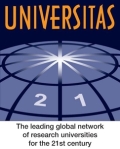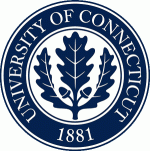 On April 11, Economics Ph.D. candidate Leshui He presented a paper at the Universitas 21 Doctoral Conference organized in Hartford by the UConn School of Business. UConn recently joined Universitas 21, which is a consortium of top universities in 13 countries. The doctoral conference brought to UConn graduate students and faculty from many member universities, providing Ph.D. students with comments on their work and an opportunity to meet and network with their counterparts from around the world. Leshui’s dissertation advisor, Professor Richard Langlois, who is a member of UConn’s Study Abroad Advisory Committee, served as discussant for a number of papers at the conference.
On April 11, Economics Ph.D. candidate Leshui He presented a paper at the Universitas 21 Doctoral Conference organized in Hartford by the UConn School of Business. UConn recently joined Universitas 21, which is a consortium of top universities in 13 countries. The doctoral conference brought to UConn graduate students and faculty from many member universities, providing Ph.D. students with comments on their work and an opportunity to meet and network with their counterparts from around the world. Leshui’s dissertation advisor, Professor Richard Langlois, who is a member of UConn’s Study Abroad Advisory Committee, served as discussant for a number of papers at the conference.
A few days later, on April 14, Leshui presented the same paper — titled “Subeconomy Meets Property Rights: A Theory of the Firm” — at the annual doctoral colloquium of the Consortium for Competitiveness and Cooperation (CCC), held this year at the Robert H. Smith School of Business of the University of Maryland.
